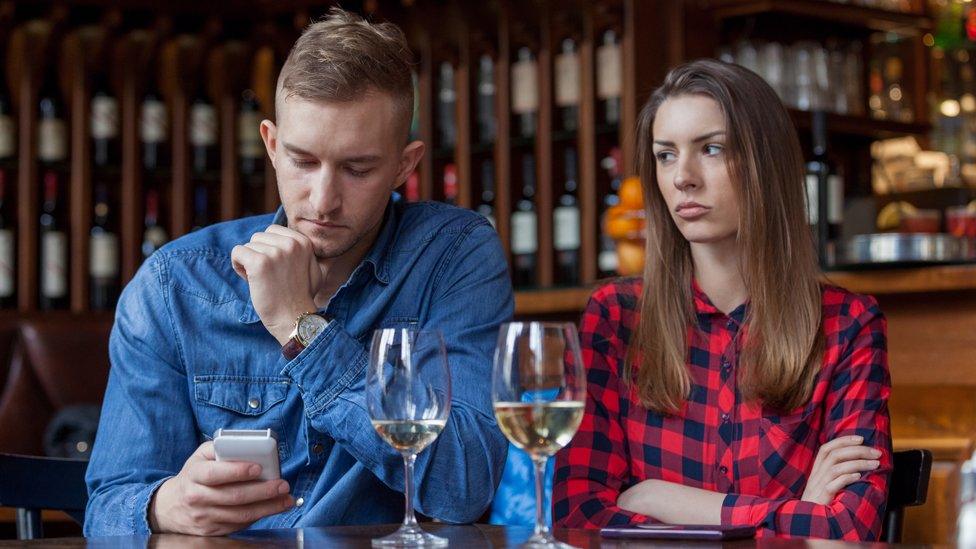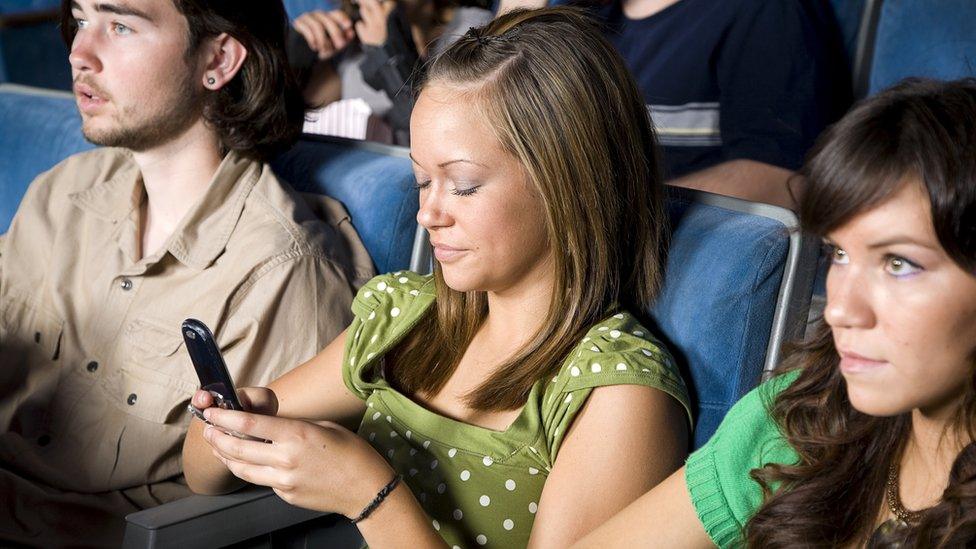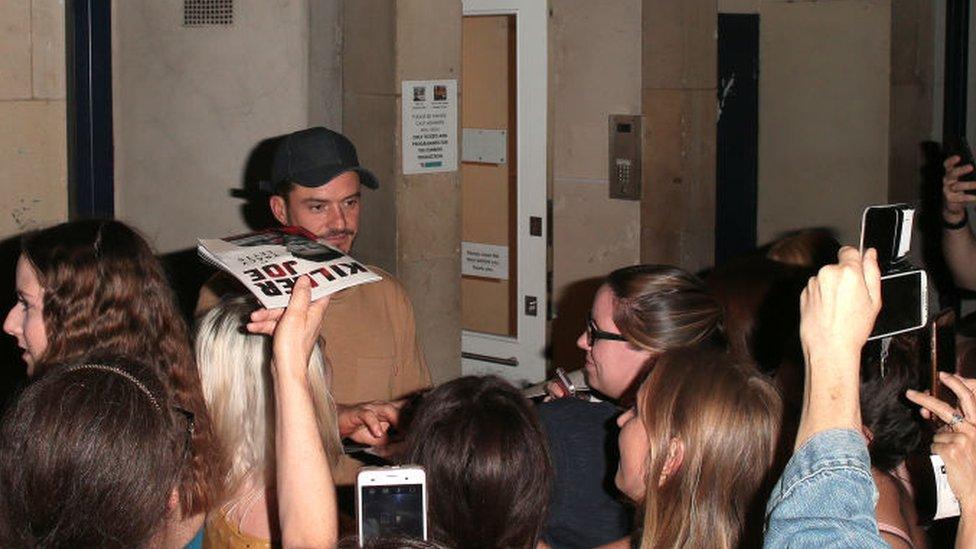Why it's OK to have 'bad manners'
- Published

It is common to hear complaints about the behaviour of others, but who gets to decide what good manners really are?
From trains to theatres to restaurants, the rules guiding our actions in public are often described as "common sense".
And yet the line between "acceptable" and "unacceptable" behaviour varies across person and place.
Think of the rows that frequently crop up about apparently mundane issues like whether it's OK to apply make-up on trains or to play music or use your phone in a restaurant., external
Instead of saying that good behaviour is "simply a question of manners", should we be asking whether it's reasonable to expect others to conform to our ideals?
Unsavoury behaviour
At their most basic level, manners are a set of shared rules that help us show consideration for other people, rather than acting only in self-interest.
This meaning can be traced all the way back to the Dutch scholar Erasmus and his 1530 text On Good Manners for Children, which encouraged an end to unhygienic practices like spitting and touching food.

On one level, then, behaviour policing is a way to reinforce social rules that genuinely aim to make public space cleaner, safer and better for all.
But manners can also be based on majority opinion and used to exert power.
For example, whereas toenail clipping in public is clearly unsavoury, arguing that make-up should only be applied in private has a less rational basis.
This can be seen as part of a wider urge to control the way other people use public space.
Training audiences
One place where manners come sharply into focus is the theatre, where audiences are usually expected to sit in silence, in close proximity.
Historically this was not always the case. In the 19th Century, audiences were retrained with new rules of behaviour favoured by elites.
Previously free to engage with performances loudly and spontaneously, suddenly audiences were being told how to behave - through programme notes, posters and even getting lectured by those on stage.
Now a similar thing is happening again. Audiences are increasingly being shamed for bringing in food, talking, and even using iPads and phones.
But in my study of online guides to theatre etiquette, I found that the way people view such rules actually varies widely.
For example, although many people think phones must be turned off completely, others say that silent mode is fine.
"Bad" behaviour in theatre is often met with accusations of selfishness and a lack of consideration for others.

Orlando Bloom halted a theatre performance of Killer Joe to ask someone to put away their iPad, according to audience members
Yet it was apparent that people have different expectations - with some people preferring a "dignified" event, while others want a more "sociable" occasion.
One of the biggest areas of disagreement is where to draw the line between appropriate and inappropriate levels of enthusiasm.
Audiences have been criticised for singing along at musicals, cheering and laughing in the wrong places, or giving too many standing ovations.
Those attending the show Motown the Musical in London last year were asked not to sing unless directed by the cast and to "moderate your enthusiasm" while in the theatre, external.
Another problem can be that some theatre-goers are especially quick to judge those who aren't just like them.
It is a point illustrated by the American playwright Dominique Morisseau, who wrote about the experience of attending the theatre as a black woman and being asked to "keep it down", external.
Unable to conform

Although everyone has a different vision of acceptable behaviour, people tend to believe their own viewpoint is "common sense".
The word "obvious" came up repeatedly when I was researching how people decide what is right and wrong.
Discussing theatre food bans, one person might say it is clearly "totally unacceptable" to bring in any food or drink, while another might suggest not being allowed to is obviously "ridiculous".
There is also a danger that rules intended to promote consideration for others actually fail to achieve their aim.
For example, expecting theatre audiences to "go to the toilet before the performance, never during" ignores those with Crohn's disease, who may need to visit the bathroom regularly.
And, as theatre-maker and comedian Jess Thom explains, staying totally silent is also impossible for people with conditions like Tourette's syndrome, which provokes verbal and physical tics.
A response to this has been a new theatre trend for relaxed performances, which allow audiences to speak, eat, drink, and move around as needed.
But should we expect people to conform to social norms, even if it means they are excluded as a result?
It is a question which goes beyond theatre to all aspects of public life.
For example, in America, graduations have resulted in families being criticised for cheering too loudly, external and "ruining" the traditional solemnity of the event.
Shaming strangers for their behaviour has many unanticipated real-world consequences.
A survey of new mothers in Scotland found that a quarter had been made to feel uncomfortable about breastfeeding in public. It is a response which could help explain the relatively low rate of breastfeeding in the UK.
A fleeting problem
There is a clear need to be considerate of others and to conform to social rules, particularly when their behaviour is a risk to others.
But deciding what is "acceptable" can also mean making a judgement about what we should prioritise when it comes to happily coexisting.
Should it be the preferences of those who want their experiences of travel, dining, and art to be free from annoying disturbances?
Or the rights of those with noisy young children, disabilities, or simply a different set of values?
For most of us, encountering moments of bad behaviour is a fleeting problem.
Maybe the most considerate thing we can do is to try not to be so quick to judge.

About this piece
This analysis piece was commissioned by the BBC from an expert working for an outside organisation.
Dr Kirsty Sedgman is a lecturer in Theatre at the University of Bristol and a British Academy postdoctoral research fellow.
She is the author of The Reasonable Audience: Theatre Etiquette, Behaviour Policing, and the Live Performance Experience.
Follow her at @KirstySedgman , external

Edited by Duncan Walker.